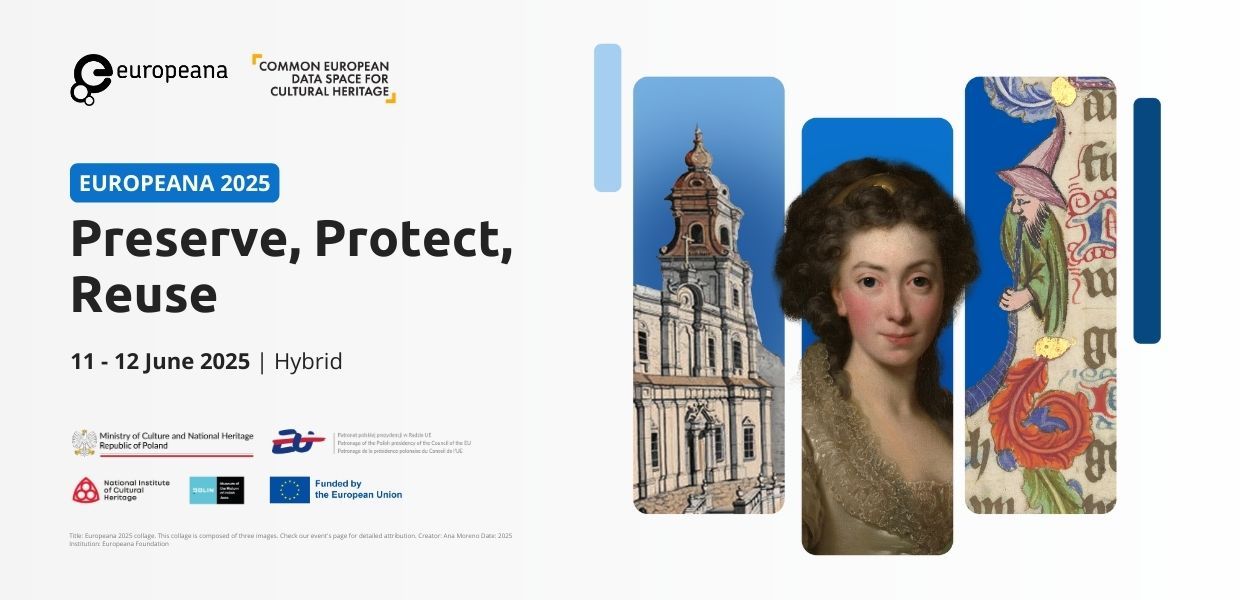At a time of growing geopolitical instability and digital interdependence, and in line with the EU’s 2025 Preparedness Union strategy, preparedness is a collective responsibility that extends to the digital heritage sector. This is not merely a technical concern, but fundamental to Europe’s cultural and social security, ensuring that our shared heritage, memory and culture remain accessible, safeguarded and enjoyed.
Today, digital methods remain unmatched in the completeness and accuracy with which they document heritage assets. Yet they also introduce new vulnerabilities: from hybrid warfare to challenges in the machine processing of heritage data. Russia's war against Ukraine has highlighted the urgent need for heritage digitisation and the rising threat of cyberattacks on cultural institutions. Digitisation is essential, but not sufficient on its own: without robust security, trusted infrastructures, resilient services and sufficient resourcing, our digital assets remain vulnerable.
As Europe’s main entry points for cultural data, Europeana and the common European data space for cultural heritage - play a key role in preserving our shared digital legacy. Their infrastructures must be robust and resilient, and empower the wider sector to embed preparedness across digital operations and infrastructures.
This Call to Action draws on insights from the Policy Forum 'Preserving Cultural Heritage: Protecting Heritage at Risk and Enhancing Cybersecurity', held on 11 June at Europeana 2025. It reflects the collective input of contributors and co-organisers, including the Ministry of Culture and National Heritage of Poland, the National Institute of Cultural Heritage, the POLIN Museum of the History of Polish Jews and the Europeana Initiative. It is inspired by the Polish Presidency's priorities to strengthen Europe’s security. It outlines five principles and five actions to ensure our sector can anticipate, respond to and recover from crises — fostering a more secure, agile and resilient digital ecosystem.
This Call to Action rests on five principles:
Holistic approach to preparedness: embedding preparedness-by-design across the entire digital preservation lifecycle - from digitisation to cybersecurity- and across operations, including measures that support a resilient workforce. Preparedness is not only a technical issue - it’s a mindset. When it comes to risk management, risks should be seen as a source of strength, not as a sign of failure
Closing the preparedness gap: supporting small and mid-sized institutions that lack equipment, standards, skills and stable funding —so that every institution, regardless of size, can help safeguard our shared heritage.
An integrated all-risks approach: considering natural, human, machine-driven and organisational threats — from climate crises to wars, cyberattacks and data misuse, to the lack of maintenance of infrastructure and human errors.
Balancing security and access: preparedness demands security, but not at the expense of openness. Strategies must secure digital assets while ensuring accessibility, public engagement and responsible data use.
The value of pan-European cooperation: enabling cost-effective solutions, mapping current practices, avoiding duplication and driving innovation. With transnational risks, shared heritage and interconnected systems, alignment of practices in Europeana and the data space are crucial, while accommodating national approaches.
To turn these principles into action, we call for and commit to supporting five key areas:
Make preparedness a core principle in designing and expanding digital infrastructures. This means building decentralised, distributed systems that reduce single points of failure, mitigate risks and enable data sharing at source. Data sharing should be based on FAIR and CARE principles. Decentralisation also demands new governance models for shared stewardship.
Empower professionals to anticipate, prevent and respond to crises. At the pan-European level, the data space can support upskilling and the development of shared standards. We also support the creation of a dedicated Working Group —potentially within the CEDCHE Expert Group—to strengthen Member State expertise and advance a unified, interoperable technical framework. Nationally, heritage institutions should have access to well-funded training programmes based on common standards tailored to local contexts. The key role of civil society should be acknowledged, with professional networks such as the Europeana Network Association acting as vital links between citizens, institutions and policymakers.
Secure dedicated and stable funding to strengthen preparedness in the sector. Ahead of the next Multiannual Financial Framework, EU institutions and Member States should prioritise targeted investments in research, innovation, technology and skills development. This should lead to the development of a new European preparedness framework centred on stability, resilience and partnerships. Sustained funding for the data space as a hub for innovation and cooperation is also essential. As digitisation efforts grow, it is key to ensure that funding for infrastructure expansion and maintenance keeps pace. At the same time, beyond sector-specific funds, funding mechanisms for security and defense should remain accessible for cultural heritage professionals and institutions.
Ensure heritage stakeholders contribute to the upcoming EU risk and threat assessment. We welcome the Commission’s decision toward a comprehensive, cross-sector, all-hazards assessment under the Preparedness Union strategy. Engaging heritage stakeholders is key to ensure relevant and inclusive solutions. Stronger collaboration between heritage actors, policymakers and civil society is needed, and can be supported by the data space.
Promote forward-looking, harmonised national and EU policies. We invite Member States to adopt national preparedness strategies that reflect their specific priorities and vulnerabilities, while fostering cross-European collaboration and interoperability. Key elements include digital registers, regular risk assessments, comprehensive training and robust crisis response plans. Cooperation is essential to enhance Europe’s response capabilities. A pilot project with interested Member States could test and refine these strategies through crisis simulations. Intersectoral cooperation to learn from sectors with advanced cybersecurity expertise must also be encouraged, paired with training resources.
We, the conveners of this Call to Action, together with our partners, commit to advancing these efforts. We call on EU institutions, Member States, cultural heritage institutions, professionals and the data space community, to act with urgency and commitment. Ongoing monitoring, sharing best practices, and collective responsibility are key to building preparedness and resilience. What defines our European way of life - our shared values and heritage - depends on a unified, unwavering commitment.

